

Connexions - Sharing Knowledge and Building Communities. Guardian Teacher Network. ...And Another Thing (about Predictive Analytics) Judging by some of the reactions I have been getting to my Data Change Everything blogpost last night, I would say I've touched a bit of a nerve.
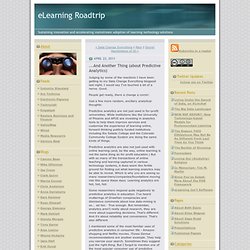
Good. People get ready, there a change a comin'. Just a few more random, ancillary analytical thoughts: Predictive analytics are not just used in for-profit universities. While institutions like the University of Phoenix and APUS are investing in analytics tools to help them improve services and customize the experience of learning online, forward thinking publicly funded institutions including Rio Salado College and the Colorado Community College System are doing the same kinds of things. Comparison of Novice and Expert And Why Games Can Help. CSU Resources Here are some resources you may find helpful from the workshop.
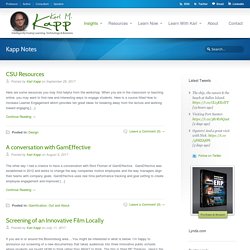
When you are in the classroom or teaching online, you may want to find new and interesting ways to engage students. Here is a course titled How to Increase Learner Engagement which provides ten great ideas for breaking away from the lecture and working toward engaging […] Continue Reading → Learning is the new work. Assessing Informal Learning. For March the LCBQ is: How do you assess whether your informal learning, social learning, continuous learning, performance support initiatives have the desired impact or achieve the desired results?
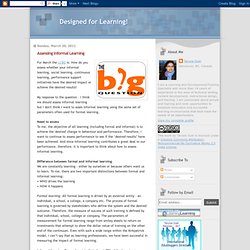
My response to the question – I think we should assess informal learning but I don't think I want to asses informal learning using the same set of parameters often used for formal learning. Need to assessTo me, the objective of all learning (including formal and informal) is to achieve the 'desired' change in behaviour and performance. Therefore, I want to continue to assess performance to see if the ‘desired results’ have been achieved. And since informal learning contributes a great deal to our performance, therefore, it is important to think about how to assess informal learning. Difference between formal and informal learning We are constantly learning - either by ourselves or because others want us to learn. The Five Myths of Informal Learning. There are misunderstandings about this critical approach.
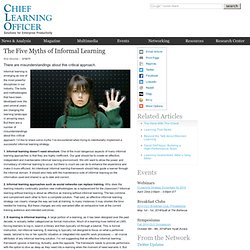
Informal learning is emerging as one of the most powerful disciplines in our industry. The tools and methodologies that have been developed over the past several years are changing the learning landscape in amazing ways.
Simbeck-Hampson Consultancy. I set out to discover the purpose of ‘education’ after hearing about the purposed campaign. After reviewing some quotes from influential scholars and some definitions on the web, a four-sided picture of education’s purpose came to mind. I began with the Wikipedia definition of education. Education in the largest sense is any act or experience that has a formative effect on the mind, character or physical ability of an individual.
In its technical sense, education is the process by which society deliberately transmits its accumulated knowledge, skills and values from one generation to another. ~ Wikipedia. What’s the New Narrative in the Education Revolution? Culture.
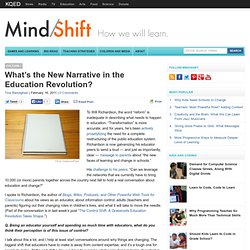
The Learning Society’s Global Ambitions. Culture Flickr: woodleywonderworks By Sara Bernard If we want our education system to adapt to the 21st century, we need to re-imagine the entire thing — not just build more of the same.
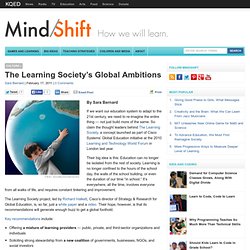
So claim the thought leaders behind The Learning Society, a concept launched as part of Cisco Systems’ Global Education initiative at the 2010 Learning and Technology World Forum in London last year. Their big idea is this: Education can no longer be isolated from the rest of society. The Learning Society project, led by Richard Halkett, Cisco’s director of Strategy & Research for Global Education, is, so far, just a white paper and a video. Ten Surprising Truths about Video Games and Learning.
How Bill Gates' Favorite Teacher Wants to Disrupt Education. Sal Khan" /> In 2008, Sal Khan had a bright future making millions as a hedge fund manager.
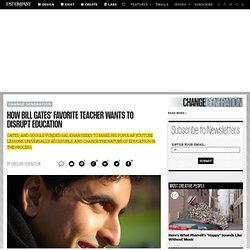
He gave it up to produce low-budget math films on YouTube for free. Fortunately, hidden among his millions of loyal students, were the wealthiest of educational philanthropists, Bill Gates and the Google Foundation. Now, with a whole lot of cash and even more street cred, Khan aims to demote the institution of "school" to just one of many educational options.
Beginnings Khan Academy, the YouTube open-course series, began as verbal contract with a 7th-grade girl. Since YouTube encouraged universal access, Khan thought “Why not? “Random people started watching it, and I started getting good feedback,” Khan tells Fast Company. All Conversations. HippoCampus: Online Content In and Out of Class. Teaching Strategies HippoCampus Teaching the Civil War Through a series of slideshow presentations, HippoCampus covers a wide range of subject areas, from the Civil War to biopsychology.
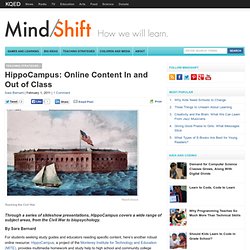
How Learning Environments Are Changing. Culture Digital Tools Teaching Strategies A school’s perimeters are no longer the only place students learn.
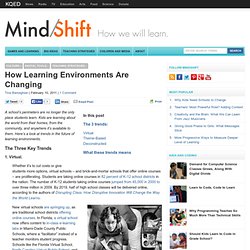
Kids are learning about the world from their homes, from the community, and anywhere it’s available to them. Here’s a look at trends in the future of learning environments. Khan Academy and BitTorrent partner to deliver P2P educational video.
Learn technology. Infotention. Train thinking & creativity. QR codes in education. Complicity: An International Journal of Complexity and Education. E-JUMP 2.0 — e-Jump 2.0. Www.ieml.org/IMG/pdf/IEML-Dictionary.pdf. Scraping for Journalism: A Guide for Collecting Data. Photo by Dan Nguyen/ProPublica Our Dollars for Docs news application lets readers search pharmaceutical company payments to doctors.
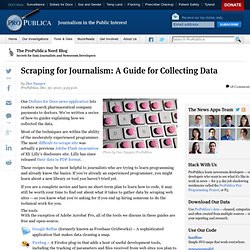
Jumper 2.0. ApexKB (formerly Jumper 2.0), is an open source web application script for collaborative search and knowledge management powered by a shared enterprise bookmarking engine that is a fork of KnowledgebasePublisher.[1] It was publicly announced on 29 September 2008.[2] A stable version of Jumper (version 2.0.1.1) was publicly released under the GNU General Public License and made available on Sourceforge on 26 March 2009 as a free software download.[3] Jumper is Enterprise 2.0 software that empowers users to compile and share collaborative bookmarks by crowdsourcing their knowledge, experience and insights using knowledge tags.
Features[edit] Jumper 2.0 is enterprise web-infrastructure for tagging and linking information resources.[5] Jumper 2.0 lets you search and share high-value content, media, or data across remote locations using knowledge tags to capture knowledge about the information in distributed storage. It collects these tags in a tag profile. Advantages[edit] History[edit] How To Prepare Yourself For Online Education. How To Prepare Yourself For Online Education Online education refers to any learning process that is partially or completely done using computer technology for the delivery or support. The concept of online education is not new. Psychology Professor Sidney Pressey developed a teaching machine using mechanics in the 1920s. Many computer-based training (CBT) applications have been developed in the 1980s to exploit the evolution of the personal computer.
However, the growth of the Internet has fueled the growth in volume and scope of what is now known as online education. Google Launches Global Online Science Fair [Video] For years, employees at Google have suggested a project near and dear to their nerd hearts: a Google-led science fair. "It's come up over and over and over again," says Cristin Frodella, a senior product marketing manager in education at Google. After all, many a Googler has fond childhood memories of explaining the genius of his or her biology experiment to passersby in a school gym. (Frodella and her best friend trained hamsters to ask for food by ringing a bell.)
Today those Googlers and budding scientists worldwide should be ecstatic. The company launched Google Science Fair, the first global online science competition. This is a far cry from your typical local science fair. Kollock.mov (video/quicktime Object) Connectivism. Editor’s Note: This is a milestone article that deserves careful study.
Connectivism should not be con fused with constructivism. George Siemens advances a theory of learning that is consistent with the needs of the twenty first century. Shelly Terrell: Global Netweaver, Curator, PLN Builder. Granny Woman Ozark Herbs. Paul LaViolette. Stigmergic systems - summary of theory. This section of the site covers the theory and background behind the application of stigmergy and other biological strategies to information technology Biological systems have evolved ingenious solutions to the same kind of problems encountered in information technology. Understanding how nature solves these problems allows us to use these solutions ourselves, to create highly efficient Web sites that cost little to develop and maintain. 11 Language Arts Resources to Try in 2011. To help you start off 2011 with some good resources to try in your classrooms, each day this week I'm posting a list of eleven good resources to try.
Monday's list featured mathematics resources, yesterday's list featured science resources, and today's list features language arts resources.